Synopsis: Geu-rae continues his work as the new employee at One International, and is faced with a new task to sign a deal with a client, who is Manager Oh’s former high school classmate. A lot of hope goes down that the deal would be smooth sailing, until Manager Oh is made to wait and pay for an expensive dinner at a high-end club. During training, Geu-rae also learns a valuable lesson with Assistant Manager Park (IT Sales Team) to understand the politics of sealing a contract.
Establishing good business/work relations between companies, or colleagues within the workplace, is crucial in the long-term for customer loyalty and satisfaction that is not only limited in South Korea, but also globally. Thus, building strong work relations would help maintain partnerships for future developments and growth between companies or coworkers. Briefly, as evident in episode six of Misaeng 미생 (also called “An Incomplete Life” 아직 살아 있지 못한 자 ) (2014), the viewers can see the interactions made between Ahn Young Gi (Kang So Ra) and her team (who is being treated unfairly despite her qualifications as a capable employee); Manager Oh (Lee Sung Min) and Byun Hyeong Chul (Lee Doll Hyung) (who is being tossed around when trying to sign a contract due to past grudges); as well as Assistant Manager Park (Choi Gwi Hwa) and Yeong Seong Industries (who is seen being pushed around trying to settle the contract) (Wikipedia, accessed June 1, 2018; Asianwiki, accessed June 8, 2018). Throughout these scenes, gaining trust or respect with the potential customer and/or others, plays an important role in setting boundaries of where these partnerships will lead – for the better, or worse. However, what goes beyond the degree of trust in business, lies in the question of status, which will be further discussed in this paper, in terms of where one stands in social hierarchy to gain respect from the other.
Due to educational inflation and rapid increase of competition intensity in South Korean society, the demand for more individuals to strive and obtain higher educational status increases, in hopes of attaining career success; thus, creates deep inequalities within society as the gap widens between the upper → middle → lower class status hierarchy (Kim and Choi 2015). This kind of inequality is highlighted briefly in the episode, as Ahn Young Yi – continues to face gender discrimination at work – gets injured while carrying wooden samples for her team and gets put down by her Assistant Manager Ha Sung Joon (Jun Suk Ho) due to her actions (Asianwiki, accessed June 8 2018). Viewers can sympathize with Ahn Young Yi’s character in this episode, since she has proven herself capable for this line of work – from previous episodes, e.g. tackling phone calls with her language skills – but her skills are often dismissed by her team based on her gender.

(Misaeng 2014: Ep. 6, time 11:06)
As socio-economic pressures placed on the individuals continues to increase, the roles and expectations that South Korean society systemically perpetuates (ideological) frameworks such as race, gender, class, status, etc., heightens the cycle of added pressure on to the employees, who are looking to move up the social ladder, or those who are working to sustain the family (Kim and Choi 2015). This is shown within the episode as well: with Byung Hyeong Chul’s skepticism and looking down on Geu-rae’s qualifications; and Assistant Manager Park’s lack of confidence to stand firm and resolve the problem with Yeong Seong Industries, creates unnecessary havoc at the One International main office, if dealt with promptly. Due to these complex structures within the work environment, the unfair treatment employee’s face, such as “income inequality and inequality in opportunity” (Chi, Rhee, and Kwon 2013: 199), does not help with the current situation for Koreans, but creates a negative effect on trust and respect (Ibid., 2013).
Added to this equation, the complexity of status within the social hierarchical structures that is intertwined by the traditional cultural etiquette and values (i.e. respecting elders, etc.), are reflected in the characters’ interactions in episode six (Yoon 2005). Viewers can see how both Manager Oh and Geu-rae, receive treatment from Byun Hyeong Chul, who repeatedly looks down on them: i.e. either by making them wait, or ‘jokingly’ make mean comments as Manager Oh tries to laugh it off and entertains him to avoid making a scene. While Geu-rae as the ‘new rookie,’ sits on the sidelines and watches Manager Oh get humiliated in front of him; viewers come to learn that Byung Hyeong Chul’s behaviour is caused by past grudges, and with his rise in power and social status – as the manager of his company – allows him to do so. In another incidence, Geu-rae comes supporting Assistant Manager Park’s involvement with Yeong Seong Industries, as viewers see him (Assistant Manager Park) struggle and get taken advantage of because of his failure to stand firm and resolve matters on his own hands.
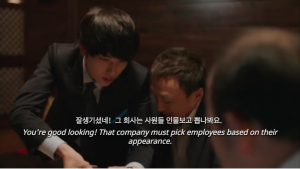
(Misaeng 2014: Ep. 6, time 25:26)
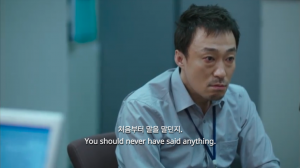
(Misaeng 2014: Ep. 6, time 33:58)
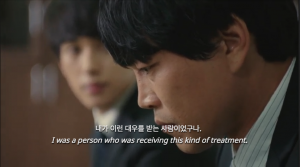
(Misaeng 2014: Ep. 6)
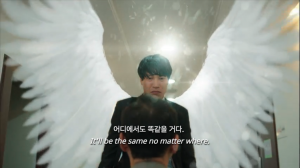
(Misaeng 2014: Ep. 6)
These moments in the episode, greatly reflects the consciousness and the status differences of Korean contemporary culture through the use of language (either between colleagues or with higher up’s, etc.); and demonstrates the cultural importance and practice of communicative competence in work relationships – including relationships one makes with others – which distinguishes one’s status or position to another (Park and Kim 2017; Yoon 2005). Thus, these social values and views shapes Korean cultural values and norms, and conversely, creates status ambiguity that potentially impacts reciprocation of social or gift exchange between individuals when one’s dominance is indebted over another and challenged (Yoon 2005; Park and Kim 2017). The drama sends a message to the audience that office or company relationships are linked and joined by trust; but is also shaped by respect, and that work relationships are not always about business itself. Despite the fact that there may be disputes on either side, relationships are still maintained although incidents happened for a reason, and that it is important to predict, prevent and learn from similar situations to improve on them for the future.
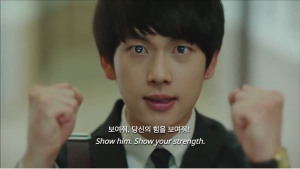
(Misaeng 2014: Ep. 6, time 47:55)
Question(s):
- In the case of Korea, what can workers do to have their voices heard to the higher up’s to ensure better work equality and work trust, etc.? OR How can major companies ensure and better accommodate to worker’s needs (e.g. work or gender equality within the workplace, work safety, etc.)? (How can this be accomplished – yes/no?)
- What do you make of Jang Baek Gi (Kang Ha Neul)’s character so far in the episode(s)? How does his attitude in ep. 6, hinder his development and growth within the company, compared to Geu-rae?
** Photos are screenshots from the drama, no copyright infringement is intended **
Bibliography
Chi, Eunju, Yangho Rhee, and Hyeok Yong Kwon. “Inequality and Political Trust in Korea.” Korea Observer 44, no. 2 (2003): 199-222.
Kim, Doo Hwan and Yool Choi. “The Irony of the Unchecked Growth of Higher Education in South Korea: Crystallization of Class Cleavages and Intensifying Status Competition.” Development and Society 44, no. 3 (2015): 435-463.
Misaeng 미생 (also called 아직 살아 있지 못한 자 “An Incomplete Life”). Directed by Kim Won Seok. South Korea: Number 3 Pictures/tvN, 2014. Streaming video. https://www.viki.com/tv/20812c-incomplete-life?locale=en.
Misaeng. Asianwiki. Accessed June 8, 2018. http://asianwiki.com/Misaeng
“Misaeng (TV Series).” Wikipedia. Accessed June 1, 2018. https://en.wikipedia.org/wiki/Misaeng_(TV_series)
Park, Patrick S. and Yong-hak Kim. “Reciprocation Under Status Ambiguity: How Dominance Motives and Spread of Status Value Shape Gift Exchange.” Social Networks 48 (2017): 142-156. https://doi.org/10.1016/j.socnet.2016.08.004.
Yoon, Kyung-Joo. “Not Just Words: Korean Social Models and the Use of Honorifics.” Intercultural Pragmatics 1, no. 2 (2005): 189-210. https://doi.org/10.1515/iprg.2004.1.2.189.
To answer your first question, I think being organized is the only way, For example, joining a union or creating one would be great to have worker’s voices heard to the higher ups. If an individual speaks about work condition and goes on strike, the power of the strike would be very weak as whichever company hired him can just replace or dismiss him. However, if a group of workers go on a strike to better their work conditions in organized manner, it would be harder for the company to replace them. Having numbers, representatives and organization would certainly make the way workers can have their voices heard to the higher ups more efficiently.
As for the second questions, I think Baek Gi is rigid and also lacks empathy as he leaves after his coworkers uncover his company’s customer company was doing delaying shipments. Regardless of outcome of the incident, Geu-rae improvises to make things better for his company. Baek Gi’s attitude of giving up without any effort, would not get him far when it comes to his career. However, being “creative” or able to improvise could get one a chance to make something dramatic happen. At the same time though, Baek Gi’s attitude could be considered as a safe option with no heavy responsibility for him. It could be considered as low risk and low return. In conclusion, Baek Gi’s attitude would provide him with safer career compare to Geu-rae’s attitude while offering also smaller chance of being dramatically successful.
I’m also curious about the whole ‘respecting your elders’/age gap/seniority phenomena as well, because it seems rather complex at times (when watching kdramas or reality tv, etc.). It seems that Korean (and Japanese) culture makes a huge emphasis on this. If anyone can explain how important it is to use the correct terms when referring to someone in culture, and if used incorrectly, would you be considered looked down upon in society or others around you.
1) For Korean workers to have their voices heard, an union must be established. The reason is that workers are often neglected as the job itself is very difficult to achieve and keep. Jobs in large corporations are often very competitive and that each worker does not want to risk losing their position. With the existence of an union that is by the workers and for the workers, the workers can anonymously file complaints to achieve a better working condition. If the complaints are not solved, all the workers can go on a strike until a good deal is reached.
2) Jang Baek Gi takes on a role of a very capable worker that is neglected. His attitude is that he has too much pride which leads to him being very careless in his work. By careless, I mean that he is not willing to do the work that he feels he should not be required to do. Because of his personality, he is unable to grow as fast as Geu-rae. This can be viewed as if it is the story of the tortoise and hare. Jang Geu-rae is the tortoise that is willing to do anything and works hard, while Baek-gi is the hare that has too much pride to step down and do the basic work.
Nice Job, Natalie. I enjoyed reading your paper.
Question #2
Can their be equality or at least more equality in the work place. Maybe. However, to get this many things would need to change. Starting from the beginning. Enforce a more open/equal opportunity hiring scheme where you hire a larger amount of minorities or “others” [those that are considered different]. Support them. Lots of team building exercises and retreats. A fair minded Human Resources that will deal swiftly, accurately, and fairly when issues occur that go against an equal work environment (sexual harassment, bullying,etc.) Have the Human Resources department focus on an open door policy. Have equal salary for specific jobs. Give equal opportunities for projects. Preferably at the top have equal or near equal amount of men/ women and from different ethnicities and sexualities even. More people with differences at the top will more likely be open for more people with differences on the bottom and middle.
Question #1
I didn’t like Jang Baek Gi to begin with (so I am quite biased) but I think he is learning what Geu-rae learned in the first couple of episodes. So he is like 4 episodes behind in growth compared to Geurae.
This is because his attitude of superiority blinds him from realizing that the company is made up of a team and you need to consider that others may know more about the company and how to run it better than you do.
However Geu-rae learned this faster as he could swallow his pride easily and he never had an attitude of superiority. He started from the bottom and he is working his way up. Whereas Jang Baek Gi is working from a solid middle to higher level and than dropped down to the bottom. Now he is slowly climbing his way up again.
Hey Natalie, what an amazing read. You addressed many important issues within One International that reflect most companies in South Korea. The way you brought up class and gender that impacts one’s experience in the workplace is very relevant in today’s current events. I believe the major companies already do what they can to meet the worker’s needs. They can create heavier punishments for immoral and unethical behaviour. They can also install security cameras to track their employees’ performance. The problem is that not everyone likes being watched and the idea of Big Brother coming into play can be very freightening for most people. Workers within a company just have to do what they are required to under theri job title. Any other work place that functions properly tries to treat each person as a professional and will not tie in personal issues with their work. It is up to the workers themselves to create a healthy environment to work in, not just the company itself. Jang Baek Gi is an intriguing and charming character. He seems to be very reliable and confident, and he knows of it himself. However, his ego tends to make him self-destructive, and consequently he lashes out on his boss when he is not given more repsonsibility. This in turn hinders his ability to grow and develop within the company. He has to understand that although he has learned a lot, there is always more to learn. Baek GI needs to acknowledge this idea so he can learn to do what is beneficial for the company. On the other hand, Geu-rae is always seeking to learn new things and will learn how to do it right before performing such a task.
Hi Natalie, good job! You mentioned lots of important issues within the Korean company. To answer your questions, 1) it is important to build an equal environment in a company. Lots of pressure from the high levels and unequal treatment will make employees hard to survive in a competitive company. Establish a union might be a good idea to let higher-ups hear the dissatisfied voice.
2) Jang Baek Gi is a completely different person compared to Geu-rae. He is rational and ambitious and doesn’t want to waste any time when he realizes Young-gu couldn’t possibly teach them anything. On the other hand, Geu-rae is so genuine and willing to learn from everyone. That’s what is going to eventually set him apart from the rest of his peers. I won’t say if they are right or wrong. Jang Baek Gi just has too much pride to do the basic work and spend time on useless things while Geu-rae is a bit naive sometimes when he making the decision.
Hi Natalie, thank you for the post.
In Korea, to have their voices heard to the higher ups, workers must come together and gather strength in numbers to send a message to higher ups, such as a petition on a specific issue or a union. If there are small complaints or reports that must be made, issues can be brought up to HR and keeping updated on that issue is key. If the worker does not take action, nothing will change in the system.
The attitude Jang Baek Gi has towards working in a company is one that is safe and the path of least resistance, but not taking risks and being innovative will hold him back from growth and praise in the future. He has a closed mind and thinks there are only 1 or 2 right ways to approach things, when there could be a million different paths one can take to deal with an issue. He must open his mind to different opinions and ideas and be empathetic to others as well to grow his intelligence and heart.
Don’t really need to have in-text citations for the drama.
Your bib looks almost perfect; just erase ) in 189-210). (Yoon, Kyung-Joo article).
Will come back again for feedback.